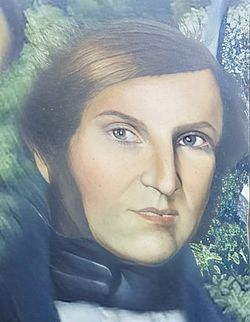Mariano Prado facts for kids
Quick facts for kids
Mariano Prado Baca
|
|
|---|---|
 |
|
| Head of State of El Salvador | |
| In office 25 July 1832 – 1 July 1833 |
|
| Preceded by | Joaquín de San Martín |
| Succeeded by | Joaquín de San Martín |
| In office 1 November 1826 – 30 January 1829 Acting Head of State |
|
| Preceded by | Juan Villacorta Díaz |
| Succeeded by | José María Cornejo |
| In office 1 October 1824 – 13 December 1824 |
|
| Preceded by | Juan Manuel Rodríguez |
| Succeeded by | Juan Villacorta Díaz |
| Political Chief of El Salvador | |
| In office 17 June 1823 – 22 April 1824 Provisional Political Chief |
|
| Preceded by | Himself as Supreme Political Chief |
| Succeeded by | Juan Manuel Rodríguez as Head of State |
| Supreme Political Chief of El Salvador | |
| In office 25 May 1823 – 17 June 1823 |
|
| Preceded by | Felipe Codallos as Political Chief |
| Succeeded by | Himself as Political Chief |
| Personal details | |
| Born |
Mariano Prado Baca
1776 León, Captaincy General of Guatemala |
| Died | 1837 (aged 60–61) Guatemala, Federal Republic of Central America |
| Nationality | Central American |
| Political party | Liberal |
| Occupation | Politician, lawyer |
Mariano Prado Baca (born 1776 – died 1837) was an important leader in Central America. He was a lawyer and served four times as the chief of state for El Salvador. At that time, El Salvador was a part of the Federal Republic of Central America. He was known for his liberal ideas and leadership.
Contents
Biography
Early Life and Education
Mariano Prado Baca was born in Nicaragua. His parents were José de la Trinidad Prado and Clara Baca. When he was young, his family moved to San Vicente, El Salvador. He first spent some time in the military. However, he soon decided to study law instead. He finished his law degree in 1797.
After becoming a lawyer, Prado became a city councilman in San Vicente. He also owned a lot of land there. In 1809, he married Engracia Vasconcelos in San Vicente.
Political Beginnings
Prado did not support the revolution that happened in 1811. After El Salvador declared its independence in 1821, he strongly opposed the idea of El Salvador joining the Mexican Empire. He became a key figure in a political group known as the "Exaltado" (meaning "Exalted").
In 1822, he was a deputy in the local congress. As the political chief of San Salvador, he helped organize a citizen army. This was important because Guatemala was threatening to invade the capital. El Salvador had chosen to leave Guatemala to avoid becoming part of Mexico.
Leading El Salvador
On February 7, 1823, the defenders had to leave San Salvador. Prado led one of the military groups during this retreat. They camped at his farm, "Santa Catalina," near San Vicente. Later, they continued their march towards Honduras but surrendered shortly after.
When Emperor Agustín de Iturbide and the Mexican Empire fell, El Salvador became independent again. Prado took on the political leadership of San Salvador. He led the Consultative Governmental Junta (a type of governing council) for the Province of San Salvador. He served as a temporary chief from June 17, 1823, to April 22, 1824. He had a second short term as temporary chief executive from October 1, 1824, to December 13, 1824.
His third term as leader was from November 1, 1826, to January 30, 1829. During this time, El Salvador stopped its relationship with the main federal government in Guatemala City. This led to another civil war, where Guatemala invaded El Salvador. The war lasted until 1829.
Challenges and Uprisings
After his third term, a conservative leader named José María Cornejo took over. Cornejo decided to remove El Salvador from the Federation. This caused federal troops, led by Francisco Morazán, to invade again. Morazán removed Cornejo from power and put Prado back in charge.
Prado's fourth term lasted from July 25, 1832, to July 1, 1833. During this time, there was an uprising by indigenous people led by Anastasio Aquino. Aquino was even crowned "King of the Nonualcos" in the church of San Vicente. Mariano Prado Baca passed away in 1837.
See also
 In Spanish: Mariano Prado para niños
In Spanish: Mariano Prado para niños
 | Audre Lorde |
 | John Berry Meachum |
 | Ferdinand Lee Barnett |

